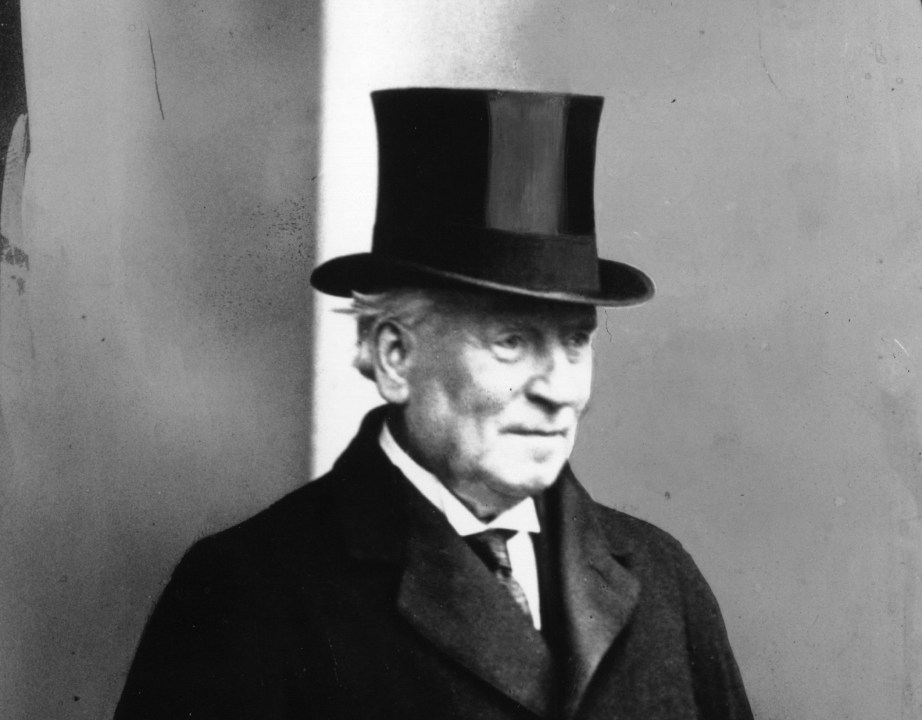As a connoisseur of British political scandals I have long puzzled over one of the most intriguing of all such affairs: did Edwardian Liberal Prime Minister H.H. Asquith have sex with Venetia Stanley, a woman young enough to be his daughter? She certainly took up huge amounts of his time and attention in August 1914 when he should have been exclusively focused on the conflict that became the first world war.
There is no doubt that the veteran PM was a ladies’ man who was notoriously ‘unsafe in taxis
The same question has now engaged the talents of the bestselling thriller writer Robert Harris, whose latest novel Precipice – out later this month – hones in on those vital summer days when Britain hovered on the brink of war, before plunging into the abyss that arguably destroyed European civilisation.
Harris examines the crisis through the prism of Asquith’s relationship with young Venetia, the aristocratic daughter of a Liberal peer, who caught the priapic premier’s eye when he became besotted with her during a Mediterranean cruise in 1912. They had first met two years before when the PM was 54 and Venetia was just 19.
Harris’s book is not out yet, but I understand that he takes the view – contrary to more cautious historians – that Asquith did indeed have a full physical affair with Venetia.
There is no doubt that the veteran PM – as well as being a virtual alcoholic nicknamed ‘Squiffy’ – was a ladies’ man who was notoriously ‘unsafe in taxis’. According to the cattily camp literary critic Lytton Strachey, he was in the habit of taking the hands of young ladies and guiding them to his groin.
After that momentous Mediterranean cruise, Asquith, despite the 35-year age gap between them, bombarded Venetia with love letters – sometimes as many as four a day – filled with political gossip and doggerel poetry declaring his deathless passion for her. His infatuation was at its height in the fatal summer of 1914 when almost continuous cabinet meetings debated whether Britain should take the plunge and join the war brewing between the major European powers.
Historians have reason to be grateful to Asquith for his unwise passion, as the letters he was scribbling to Venetia during those very meetings (when his cabinet colleagues assumed he was taking notes on their views) are often our only source about the vital decisions on peace and war that his government was taking.
Even when his brilliant eldest son Raymond was leaving for the front, Asquith forswore a farewell meeting with him so that he could go instead to the London Hospital to see Venetia in her newly acquired nurses’ uniform. Raymond was later killed in the Somme.
Unsurprisingly, the course of love between the heartsick PM and the cool young lady did not run smoothly. One problem was that another member of his family – his daughter Violet – had conceived a Sapphic crush on her friend Venetia and was also wooing her with love letters.
Perhaps more seriously, another guest on that fateful 1912 cruise had also fallen for Venetia’s charms. This was Edwin Montagu, a protege of the PM he had just promoted to become a minister. Unknown to Asquith, Montagu too began to besiege Venetia with love letters and pleas to marry. There were two problems with Montagu’s amorous suit. Firstly, he was universally seen as being not only dull but repulsively ugly. With a shudder of disgust Venetia talked of his ‘Over-sized head and pock marked face’ and told a jealous Violet that she couldn’t bear to kiss him.
Secondly, Montagu was a wealthy Jew, and his father had threatened to disinherit him if he married outside the faith. Nevertheless, he continued to pursue Venetia relentlessly as the war began, and although she turned down his marriage proposal at first, she became alarmed by the PM’s increasingly frenzied parallel pursuit of her. In 1915, in the midst of an existential government crisis, she told Asquith that she would after all wed Montagu and convert to Judaism in order to secure his inheritance.
Though Asquith told Venetia that her news had ‘broken my heart’ he quickly recovered and even forgave Montagu, promoting him to the cabinet. Indeed, true to form , the PM was soon in erotic correspondence with a new love interest: none other than Venetia’s younger sister Sylvia. Asquith’s long suffering second wife Margot – who had borne the PM five children – was well used to her husband’s extra-marital proclivities, and spoke tolerantly of the ‘little harem’ he had gathered.
Sylvia was married to an officer at the front who (almost needless to say) was also enjoying a correspondence with Venetia. Well aware of Asquith’s reputation as a groper, the younger sister was careful to keep him at a safe distance whenever they were alone.
The Montagu marriage was not destined to prosper. Whether or not Venetia was a virgin bride when she walked down the aisle, she certainly enjoyed a healthy love life thereafter. The only child from her marriage, Judy, later a close friend of Princess Margaret, was almost certainly not fathered by Montagu, but by one of her legion of lovers.
The ill matched pair brought a magnificent Tudor mansion, Breccles Hall in Norfolk , and used more Montagu money in commissioning the renowned architect Edwin Lutyens to modernise the house and gardens. Winston Churchill, a close friend of the couple, was a frequent visitor and painted a charming view of the interior.
In 1916, exasperated by his chief’s half-hearted conduct of the war, the dynamic David Lloyd George outmanoeuvred Asquith and overthrew him, forming a new coalition with the Tories. The Liberals bitterly split into Asquithian and Lloyd George factions, and would never form a one party government again. Montagu betrayed Asquith and joined Lloyd George’s government as Secretary of State for India.
In 1924, he fell victim to a mysterious malady, died aged only 45, and was buried on the Breccles estate. Venetia became a very merry widow and enjoyed affairs with many men including the press baron Lord Beaverbrook and the immensely rich scientist, spy and polymath Victor Rothschild. In middle age she took up flying, and romanced the young pilot who flew with her around the world.
Just before his death in 1928, Asquith made a long car journey to Breccles for a sentimental final meeting with Venetia . In the second world war she was a regular guest of the Churchills. She died of cancer aged 60 in August 1948, and despite their differences, her ashes were buried with Montagu at Breccles, leaving an enigma behind: did she or didn’t she have an affair with old ‘Squiffy’?
Does such ancient tittle tattle matter? I would argue that it did matter very much that as government and nation were fatally divided about whether or not to join the war, the Prime Minister was distracted from his duties and more interested in sharing military secrets with his lady love than his own cabinet.
Asquith’s conduct, whether he seduced Venetia or not, was foolish, reprehensible, and irresponsible. In our #MeToo age of social media it would be impossible to hide, but in that deferential era he got away with it.








Comments